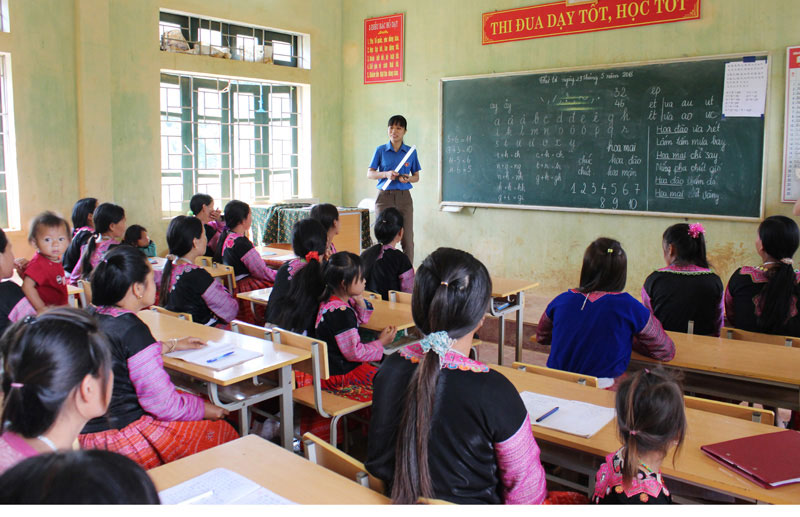
(HBO) – As of September 2018, all the 23 communes and towns of Mai Chau district completed the universalizing of nursery education for children aging five years old and met all the criteria for the popularization of primary education at the third level, secondary education at the second level, and standards of illiteracy eradication at the second level.
However, in reality, the universalizing of
nursery, primary and secondary education and literacy eradication has been
modest in scale, with unstable efficiency in many communes.
The ratio of re-illiteracy remains high,
while the education universalizing for children at right age is unstable in
many poor communes and areas such as Hang Kia and Tan Dan, requiring regular
measures of settlement. This is the most challenging issue in education universalizing
in Mai Chau.

The organisation of illiteracy eradication
classes in Hang Kia in March 2018 was considered a breakthrough in the
education popularising and illiteracy elimination of Mai Chau district.
Hang Kia is a "hot spot” in illiteracy of
Mai Chau. Statistics showed that it is home to about 800 illiterate and
re-illiterate people aging from 18 years old and above.
With the poverty rate of 55 percent, locals
who finish primary education have no chance to access books after they get
married, thus becoming illiterate again, which is the main reason for the high
illiteracy rate.
Some other people do not go to school and
become completely illiterate. Many cannot speak Vietnamese, which prevent them
to make conversations and refuse to learn.
With the support of the provincial
Department of Education and Training, in March 2018, Mai Chau opened three classes
to eradicate illiteracy at the first level for 76 trainees.
From the success of the classes in the
Hang Kia B primary and secondary school, on August 14, 2018, Mai Chau continued
launching four other classes for 92 locals. All the trainees are women from
Mong ethnic minority group at the age of 18-24. After these classes, the outcomes
of illiteracy elimination in the district will be significantly enhanced./.
The emulation movement "Hoa Binh joining hands to build new-style rural areas” has been widely spreading, becoming a driving force that motivates the localities to renew rural landscapes and improve the material and spiritual lives of the residents. In this movement, the people play a central role-both as the main implementers and direct beneficiaries of its outcomes.
In response to the global digital revolution, Hoa Binh Newspaper is transforming itself into a modern and multi-platform media hub, blending cutting-edge technology with a restructured newsroom and a new generation of tech-savvy journalists.
Hoa Binh province’s Association of the Elderly recently held a conference to review the project on expanding the inter-generation self-help club model until 2025.
In a move to implement Resolution No. 57-NQ/TW, issued on December 22, 2024 by the Politburo, which targets breakthroughs in science-technology development, innovation, and digital transformation, the Hoa Binh provincial Department of Health has issued a plan to roll out the "Digital Literacy for All” campaign within the local health sector.
An Nghia Commune (Lạc Sơn District) is one of the communes that achieved the tha standard of the national new rural area in 2018. Entering a new development phase, the commune is now trying to meet the criteria for the advanced new rural development. With the strong political will and the public consensus, the commune is gradually overcoming the challenges to reach this goal, aiming for the sustainable development.



